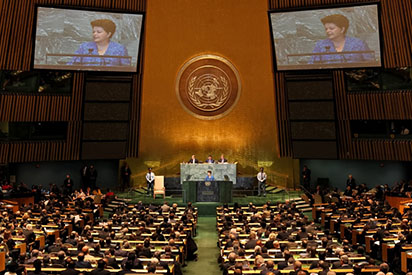New UN resolution endorses Care for Children's pioneering family placement work in Asia
20 December 2019
On Tuesday 17th December 2019, the UN made a landmark resolution for the protection of orphaned and vulnerable children around the world. A new Rights of the Child resolution was adopted by 193 member states of the UN, pledging to gradually end the support and use of orphanages and increase focus and efforts to promote family-based alternatives.
2019 is the 10th anniversary of the UN guidelines for the alternative care of children. The purpose of this new resolution is to further regulate and improve childcare legislation and policies worldwide. The resolution has eight main themes which Care for Children either directly works to achieve or certainly advocates for:
- Recognise and prioritise the role of families
- Support families and prevent unnecessary family-child separation
- Protect children without parental care and ensure high-quality, appropriate alternative care
- Recognise the harm of institutional care for children and prevent institutionalisation
- Strengthen child welfare and protection systems and services
- Ensure adequate financial and human resources
- Improve data collection and regular reporting
- Ensure full participation of children without parental or family care
There are a total of 64 recommendations within these eight themes, including an emphasis on the role of the State, as highlighted in recommendations 24 & 31:
[24] the Convention on the Rights of the Child recognizes that a child, for the full and harmonious development of his or her personality and potential, should grow up in a family environment and that a child temporarily or permanently deprived of his or her family environment, or in whose own best interests cannot be allowed to remain in that environment, shall be entitled to special protection and assistance provided by the State
[31] Urges States to strengthen child welfare and protection systems
[31] Urges States to strengthen child welfare and protection systems
Recommendation 26 notes that:
[26] children without parental care are more likely than their peers to experience human rights violations, such as exclusion, violence, abuse, neglect and exploitation, and in this regard expresses deep concern on the potential harm of institutionalization and institutional care to children’s growth and development;
There is also an emphasis on training, as noted in recommendation 35 (g), where the resolution urges States to take effective action to provide support to families and to prevent the unnecessary separation of children from their parents, by:
[35 (g)] Progressively replacing institutionalization with quality alternative care, including, inter alia, family and community-based care and, where relevant, redirecting resources to family and community-based care services, with adequate training and support for caregivers and robust screening and oversight mechanisms;
These new resolutions are an encouraging endorsement of the work Care for Children pioneered in China over 22 years ago.
- Launched in 1998, and funded by the Department for International Development, Care for Children initiated a pilot project with the Ministry of Civil Affairs in Shanghai, on what was the first joint venture social welfare programme between the British and Chinese governments, to introduce family placement as a positive alternative to institutional care for orphaned and vulnerable children.
- In 2003 the success of the pilot project led to an invitation from the Ministry of Civil Affairs in Beijing to replicate the project nationwide, training all government run child welfare institutions.
- Care for Children’s Research and Training Manager, Dr. Nina Zhang, conducted substantial research throughout the country showing the psychological and physical outcomes of children who were placed into local families from institutional care.
- In 2014 Care for Children worked with the Ministry of Civil Affairs to develop the first legislation in China that promoted family placement over institutional care. By 2018 the Beijing Bureau of Statistics reported that over 80% of disadvantaged children in China (estimated to be over one million) were living in families rather than institutions.
- Since 2012, new projects have been launched with the relevant ministries in Thailand and Vietnam, with a new project to be launched in Cambodia in 2020.
Dr Robert Glover OBE, Care for Children’s Founder and Executive Director, who lived in China up until 2015 said:
“It is remarkable that given there was not a word in Mandarin for family placement in 1996, twenty years on the Chinese authorities have made a significant social welfare reform for children, offering a whole generation of disadvantaged children a family of their own”.
Following the first national family placement conference in Phnom Penh, Cambodia, in November 2019, co-hosted by the Cambodian Ministry Veterans Social Affairs and Youth Rehabilitation and Care for Children, Lord Laming, Care for Children’s previous Chairman of the Board of Trustees and Honorary Patron who attended the conference, remarked:
“Cambodia has a large number of children in orphanages and no government-managed fostering services at present, but I am excited that the Cambodian government has invited Care for Children to enable a new direction in their child welfare system, and develop a much wider range of facilities for disadvantaged children.”
Dr Glover would like to thank all the support and encouragement from the UK Department for International Development, USAID the IKEA Foundation along with many other friends and supporters who ask to be nameless for their support over the past 22 years of work.
“Let’s celebrate today together this wonderful support that has supported all Care for Children’s grassroot work, research, outcomes, that has changed policy and legislation, today endorsed by the UN General Assembly”. Dr Robert Glover OBE
This resolution is an important demonstration of the global commitment to supporting children without parental care. Leading up to this significant breakthrough at the United Nations, Care for Children played an active role in a coalition of over 250 child protection organisations that developed these recommendations for governments. Care for Children welcomes this new commitment by UN member states to seek new and better opportunities and solutions to ensure all children have the opportunity to grow up in a family.
Care for Children’s mission is to partner with governments to help create a positive alternative to institutional care for disadvantaged children through local family-based care.
Care for Children has a vision to see a world of children in families.

Explore what’s happening in our Latest News
Cambodia Project Launched
13 January 2022
Care for Children officially launches Cambodia project during a signing ceremony with the Ministry of social Affairs, Veterans and Youth Rehabilitation in Phnom Penh, Cambodia.


